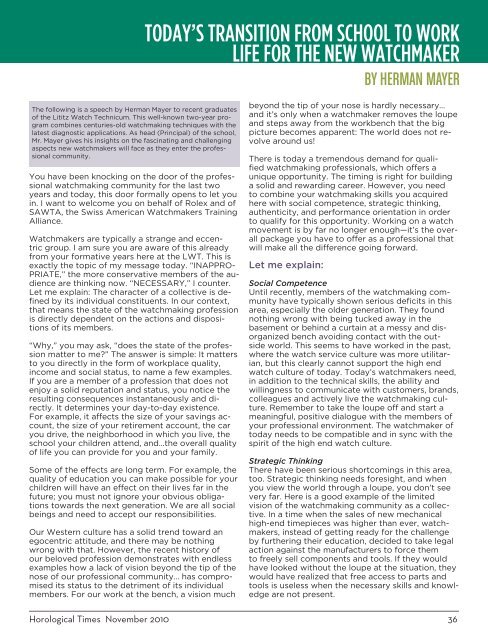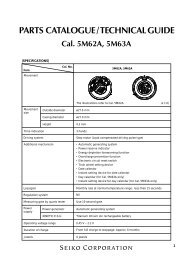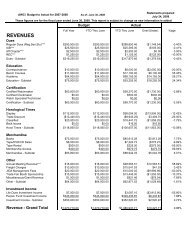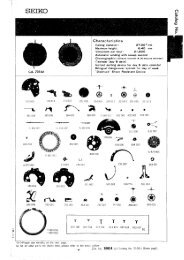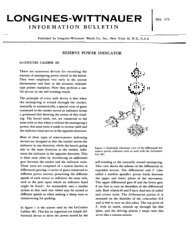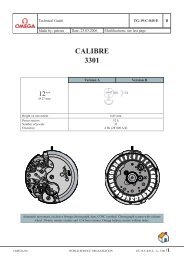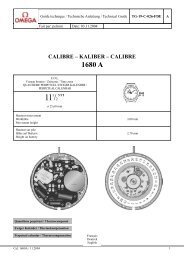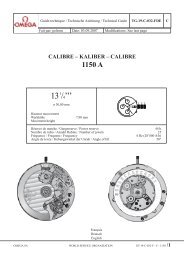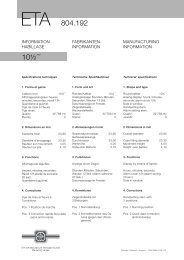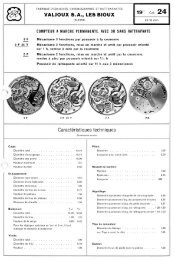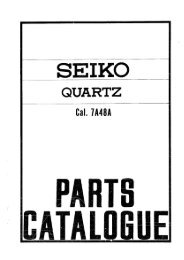PDF Version - The American Watchmakers-Clockmakers Institute
PDF Version - The American Watchmakers-Clockmakers Institute
PDF Version - The American Watchmakers-Clockmakers Institute
Create successful ePaper yourself
Turn your PDF publications into a flip-book with our unique Google optimized e-Paper software.
TODAY’S TRANSITION FROM SCHOOL TO WORK<br />
LIFE FOR THE NEW WATCHMAKER<br />
By Herman Mayer<br />
<strong>The</strong> following is a speech by Herman Mayer to recent graduates<br />
of the Lititz Watch Technicum. This well-known two-year program<br />
combines centuries-old watchmaking techniques with the<br />
latest diagnostic applications. As head (Principal) of the school,<br />
Mr. Mayer gives his insights on the fascinating and challenging<br />
aspects new watchmakers will face as they enter the professional<br />
community.<br />
You have been knocking on the door of the professional<br />
watchmaking community for the last two<br />
years and today, this door formally opens to let you<br />
in. I want to welcome you on behalf of Rolex and of<br />
SAWTA, the Swiss <strong>American</strong> <strong>Watchmakers</strong> Training<br />
Alliance.<br />
<strong>Watchmakers</strong> are typically a strange and eccentric<br />
group. I am sure you are aware of this already<br />
from your formative years here at the LWT. This is<br />
exactly the topic of my message today. “INAPPRO-<br />
PRIATE,” the more conservative members of the audience<br />
are thinking now. “NECESSARY,” I counter.<br />
Let me explain: <strong>The</strong> character of a collective is defined<br />
by its individual constituents. In our context,<br />
that means the state of the watchmaking profession<br />
is directly dependent on the actions and dispositions<br />
of its members.<br />
“Why,” you may ask, “does the state of the profession<br />
matter to me” <strong>The</strong> answer is simple: It matters<br />
to you directly in the form of workplace quality,<br />
income and social status, to name a few examples.<br />
If you are a member of a profession that does not<br />
enjoy a solid reputation and status, you notice the<br />
resulting consequences instantaneously and directly.<br />
It determines your day-to-day existence.<br />
For example, it affects the size of your savings account,<br />
the size of your retirement account, the car<br />
you drive, the neighborhood in which you live, the<br />
school your children attend, and…the overall quality<br />
of life you can provide for you and your family.<br />
Some of the effects are long term. For example, the<br />
quality of education you can make possible for your<br />
children will have an effect on their lives far in the<br />
future; you must not ignore your obvious obligations<br />
towards the next generation. We are all social<br />
beings and need to accept our responsibilities.<br />
Our Western culture has a solid trend toward an<br />
egocentric attitude, and there may be nothing<br />
wrong with that. However, the recent history of<br />
our beloved profession demonstrates with endless<br />
examples how a lack of vision beyond the tip of the<br />
nose of our professional community… has compromised<br />
its status to the detriment of its individual<br />
members. For our work at the bench, a vision much<br />
beyond the tip of your nose is hardly necessary…<br />
and it’s only when a watchmaker removes the loupe<br />
and steps away from the workbench that the big<br />
picture becomes apparent: <strong>The</strong> world does not revolve<br />
around us!<br />
<strong>The</strong>re is today a tremendous demand for qualified<br />
watchmaking professionals, which offers a<br />
unique opportunity. <strong>The</strong> timing is right for building<br />
a solid and rewarding career. However, you need<br />
to combine your watchmaking skills you acquired<br />
here with social competence, strategic thinking,<br />
authenticity, and performance orientation in order<br />
to qualify for this opportunity. Working on a watch<br />
movement is by far no longer enough—it’s the overall<br />
package you have to offer as a professional that<br />
will make all the difference going forward.<br />
Let me explain:<br />
Social Competence<br />
Until recently, members of the watchmaking community<br />
have typically shown serious deficits in this<br />
area, especially the older generation. <strong>The</strong>y found<br />
nothing wrong with being tucked away in the<br />
basement or behind a curtain at a messy and disorganized<br />
bench avoiding contact with the outside<br />
world. This seems to have worked in the past,<br />
where the watch service culture was more utilitarian,<br />
but this clearly cannot support the high end<br />
watch culture of today. Today’s watchmakers need,<br />
in addition to the technical skills, the ability and<br />
willingness to communicate with customers, brands,<br />
colleagues and actively live the watchmaking culture.<br />
Remember to take the loupe off and start a<br />
meaningful, positive dialogue with the members of<br />
your professional environment. <strong>The</strong> watchmaker of<br />
today needs to be compatible and in sync with the<br />
spirit of the high end watch culture.<br />
Strategic Thinking<br />
<strong>The</strong>re have been serious shortcomings in this area,<br />
too. Strategic thinking needs foresight, and when<br />
you view the world through a loupe, you don’t see<br />
very far. Here is a good example of the limited<br />
vision of the watchmaking community as a collective.<br />
In a time when the sales of new mechanical<br />
high-end timepieces was higher than ever, watchmakers,<br />
instead of getting ready for the challenge<br />
by furthering their education, decided to take legal<br />
action against the manufacturers to force them<br />
to freely sell components and tools. If they would<br />
have looked without the loupe at the situation, they<br />
would have realized that free access to parts and<br />
tools is useless when the necessary skills and knowledge<br />
are not present.<br />
Horological Times November 2010 36


